1846-1848
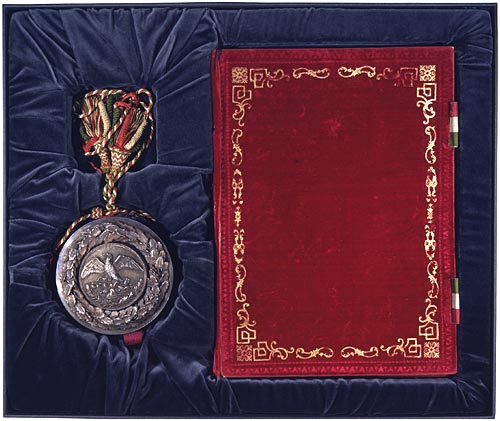
The Mexican War began in 1846 and ended in 1848 with the signing of the Treaty of Guadalupe Hidalgo. Mexico agreed to cede much of the American southwest to the United States in exchange for $15 million dollars. This territory included the future state of Utah.
1850
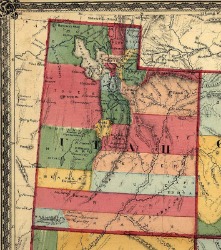
As part of the Compromise of 1850, Senator Henry Clay introduced the Utah territorial bill, allowing for the establishment of a territorial government in Utah. The Utah Territory was established by Congress on September 9, 1850.
1862
The Senate passed the Anti-Bigamy Act, aimed at Utah Mormons. This legislation banned multiple marriages and disincorporated the Mormon Church’s structure. It was laxly enforced by the federal government as a result of the Civil War while Mormon control of Utah courts further stalled enforcement of the law in the Utah territory.
1870
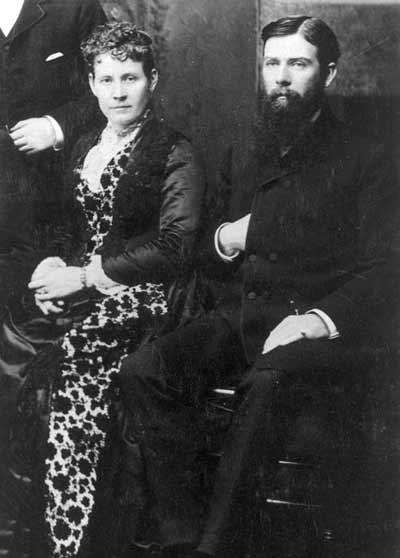
The territory of Utah granted women the right to vote. That right was taken away by the Edmunds-Tucker Act of 1887, but in 1895, the right for women to vote and to hold public office was written into the state constitution.
1894
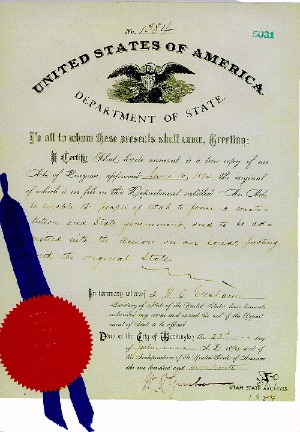
Congress passed the Utah Enabling Act, authorizing the admittance of Utah into the Union, pending compliance with certain congressional mandates, including the banning of polygamy.
1896

Frank Cannon, Republican from Ogden, and Arthur Brown, Republican from Salt Lake City, were elected as the state’s first two senators.
1896

Frank Cannon and Arthur Brown presented their credentials, took the oath of office, and were seated in the U.S. Senate. The senators then drew lots to determine class assignment. Cannon drew Class 1, with a term to expire March 3, 1899. Brown drew Class 3, with a term to expire March 3, 1897.
1896
Senator Frank Cannon switched parties to become a Silver Republican. Silver Republicans split with the Republican Party over the fight for free silver versus the gold standard.
1898
Frank Cannon lost his campaign for reelection. Utah had only one senator for the next two years as the legislature failed to elect a new senator.
1903

Reed Smoot, a Republican from Provo and a leader in the Mormon Church, replaced Joseph Rawlins in the Senate. As soon as he arrived in Washington he faced his first controversy. His credentials as a senator were challenged on the grounds that his religious beliefs made it impossible for him to faithfully execute his position as senator. The Senate decided to seat him but launched an investigation into the matter.
1906
Former senator Arthur Brown was murdered by his mistress in an ugly and bizarre incident. Brown was working in Washington, D.C., as a lawyer when he received notice from his alleged mistress that she believed he should marry her because he was the father of her child. The woman implored him to “do the right thing.” He refused to marry her, and in response, she took a train to Washington and shot him. Brown was shot on December 8 and died four days later.
1907
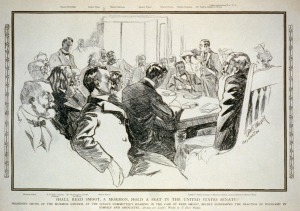
The United States Senate voted not to expel Senator Reed Smoot for his leadership role in the Mormon Church.
1914
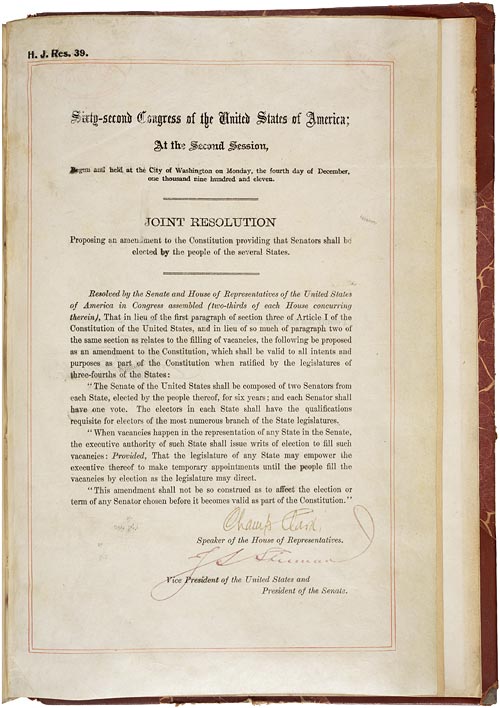
In winning re-election, Reed Smoot became Utah’s first directly elected senator under the terms of the Seventeenth Amendment to the U.S. Constitution.
1917

William H. King of Salt Lake City was elected Democratic Conference secretary and served in that capacity until 1927.
1923
Reed Smoot became chairman of the Senate Committee on Finance, a position he held until 1933.
1930
The Smoot-Hawley Tariff Act, cosponsored by Senator Reed Smoot, was signed into law. It was widely considered a disaster. The act raised U.S. tariffs on over 20,000 imported goods to record levels, triggering other countries to raise their tariffs, and consequently limiting the market for American goods. It was popularly blamed for prolonging and exacerbating the Great Depression.
1937

Elbert Thomas became chairman of the Senate Committee on Education and Labor (today's Committee on Health, Education, Labor, and Pensions), serving until 1945.
1940
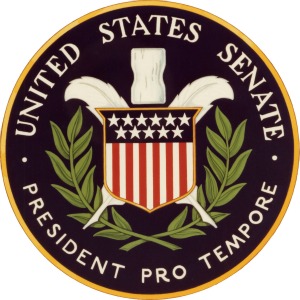
William King was elected to serve as president pro tempore of the Senate. He held this position until 1941.
1944
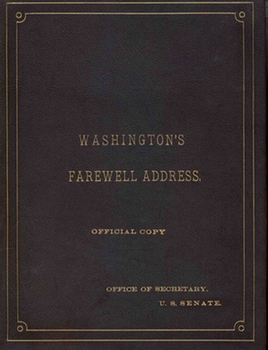
Senator Elbert D. Thomas of Salt Lake City read George Washington's Farewell Address on the floor of the Senate, a tradition dating to 1862.
1950
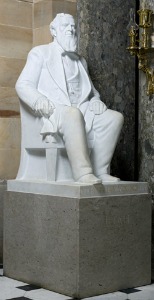
A statue of Brigham Young was unveiled at the U.S. Capitol as Utah's first contribution to the National Statuary Hall Collection. Brigham Young was a famous leader in the Church of Latter Day Saints, served as the founder of Salt Lake City, and was the first governor of the Utah territory.
1954

Arthur Watkins of Orem served as chairman of the Select Committee to Study Censure Charges against Joseph McCarthy. In 1954 the Senate censured Joe McCarthy for conduct unbecoming of a senator.
1960

Senator Frank Edward "Ted" Moss of Salt Lake City read George Washington's Farewell Address on the floor of the Senate, a tradition dating to 1862.
1970
The Public Health Cigarette Smoking Act, championed by Ted Moss, was signed into law by President Richard Nixon. The law required tougher labels on cigarette packages and banned cigarette advertisements on radio and television.
1971

Senate Democrats elected Ted Moss as their Conference secretary. He served in that position until 1976.
1973

Senate Republicans elected Wallace F. Bennett of Salt Lake City as their Conference secretary, a position he held until his retirement at the end of 1974.
1973
Ted Moss became chairman of the Senate Committee on Aeronautics and Space Science (now the Committee on Commerce, Science, and Transportation), serving until 1977.
1975

Senator Edwin Jacob (Jake) Garn of Salt Lake City read George Washington's Farewell Address on the floor of the Senate, a tradition dating to 1862.
1979

Republicans elected Jake Garn as their Conference secretary, a position he held until 1985. Orrin Hatch of Salt Lake City lost the race for the chairmanship of the National Republican Senatorial Committee to John Heinz of Pennsylvania by a vote of 21 to 20.
1981
Jake Garn became chairman of the Senate Committee on Banking, Housing, and Urban Affairs, serving until 1987. Orrin Hatch became chairman of the Senate Committee on Labor and Human Resources (today's Committee on Health, Education, Labor, and Pensions), serving until 1987.
1985
Senator Jake Garn became the first sitting member of the U.S. Congress to fly into space when he flew aboard the Space Shuttle Discovery as a payload specialist during NASA mission STS-51-D.
1990
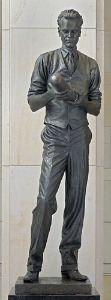
A statue of Philo T. Farnsworth, inventor of the first completely electronic television, was unveiled in the U.S. Capitol as Utah's second contribution to the National Statuary Hall Collection.
1995
Orrin Hatch became chairman of the Senate Committee on the Judiciary, serving until 1999. He chaired the committee again in 2001, and from 2003 to 2005.
1996

Robert Bennett of Salt Lake City received the Golden Gavel Award for presiding over the Senate for 100 hours in a single session of Congress.
2007

Orrin G. Hatch became Utah's longest-serving senator, surpassing Reed Smoot's record of 30 years. Hatch was first elected to the Senate in 1976.
2024

A bronze statue of Martha Hughes Cannon was unveiled in the U.S. Capitol as part of the National Statuary Hall Collection. Cannon replaced the statue of Philo T. Farnsworth that was unveiled in 1990.
2025

Mike Lee of Alpine became chairman of the Senate Committee on Energy and Natural Resources.